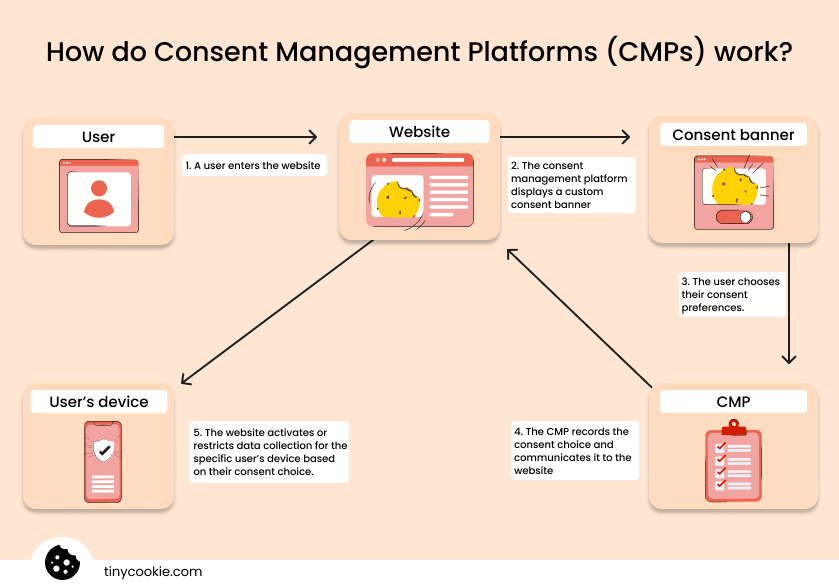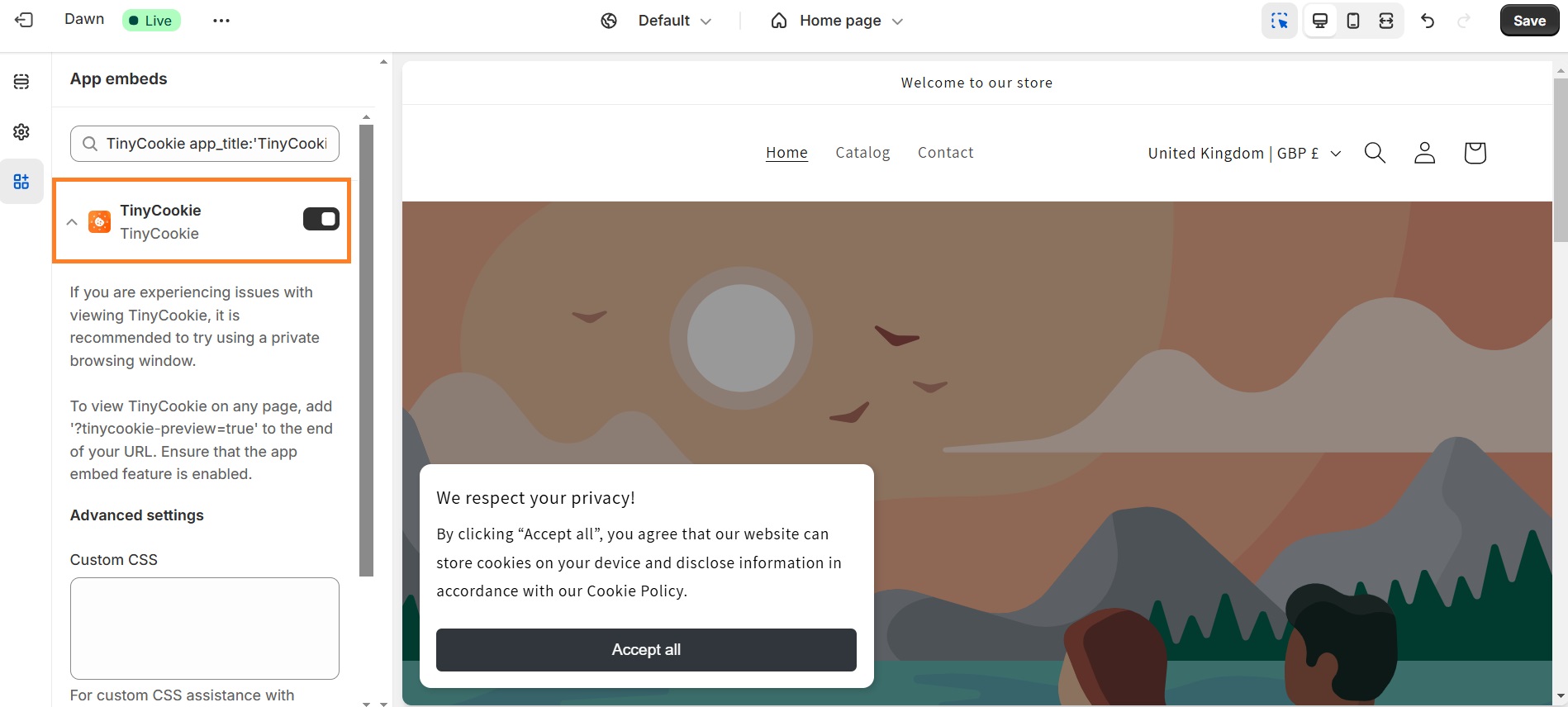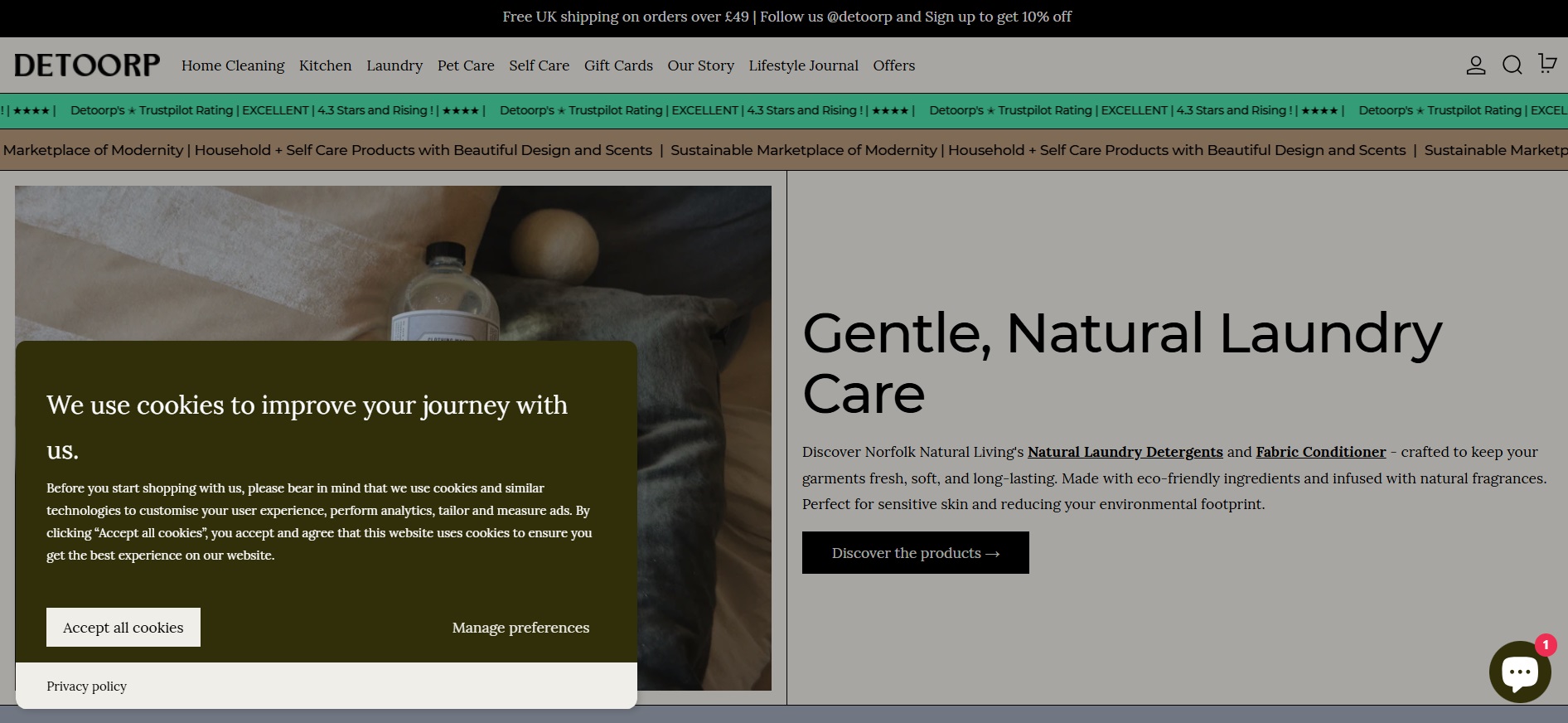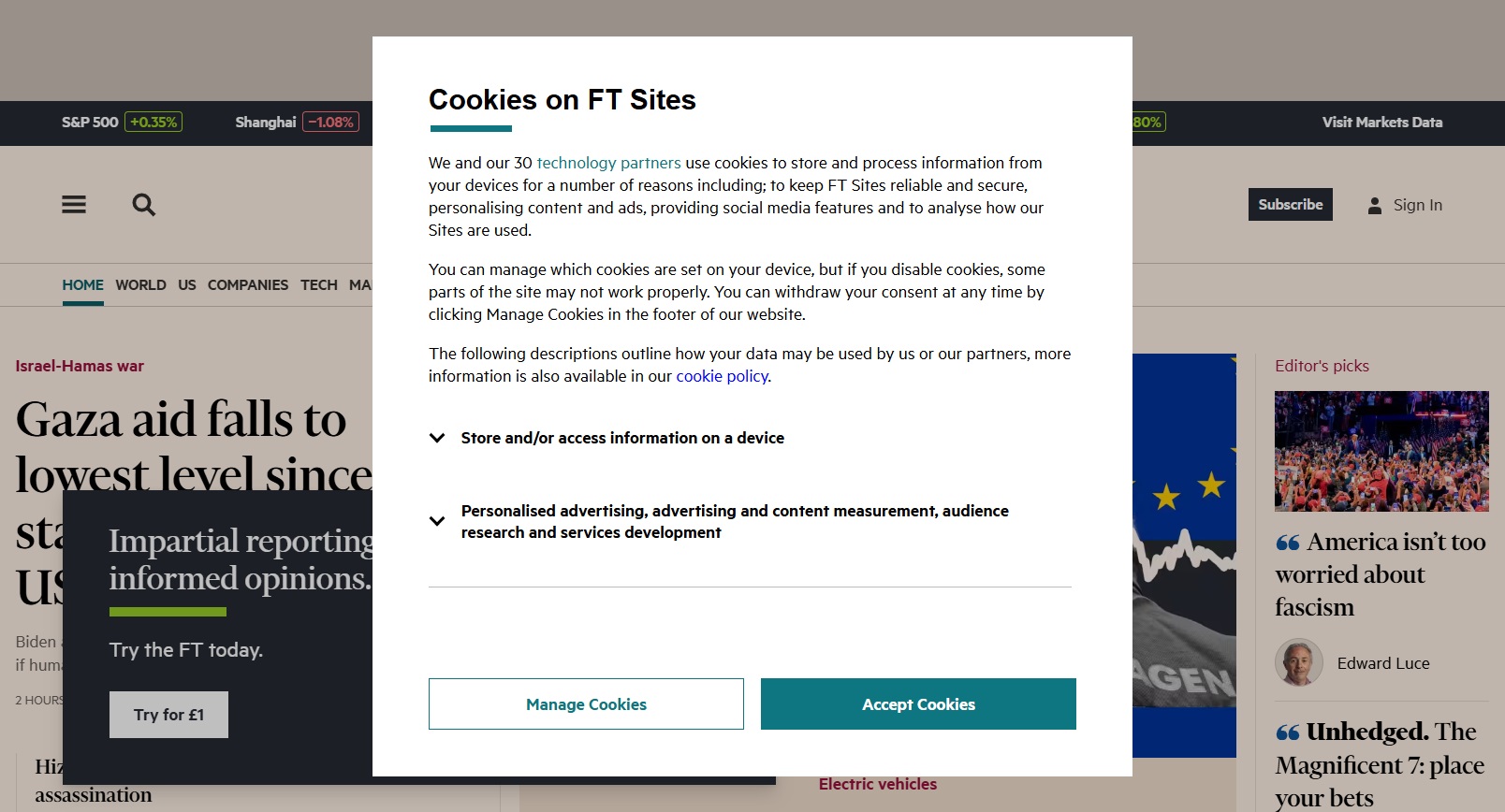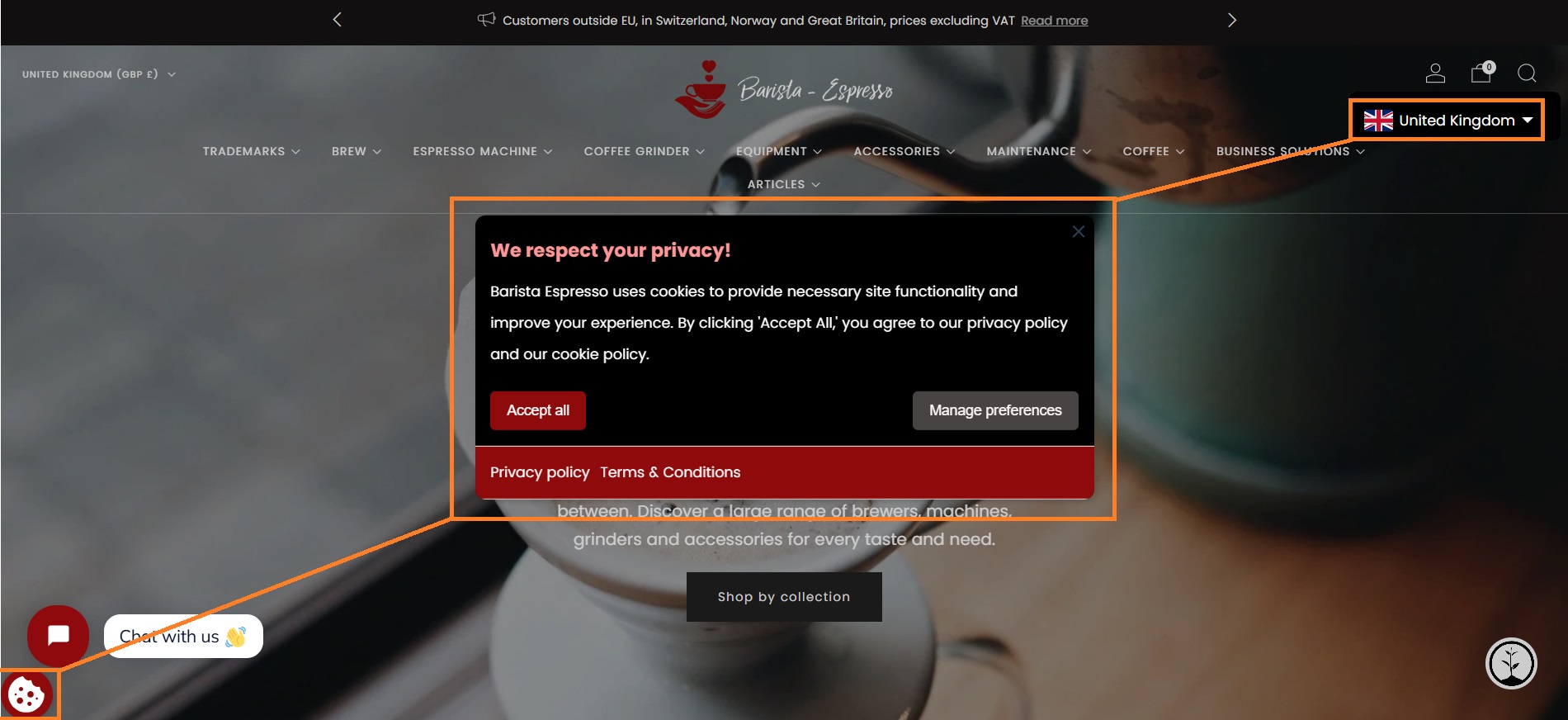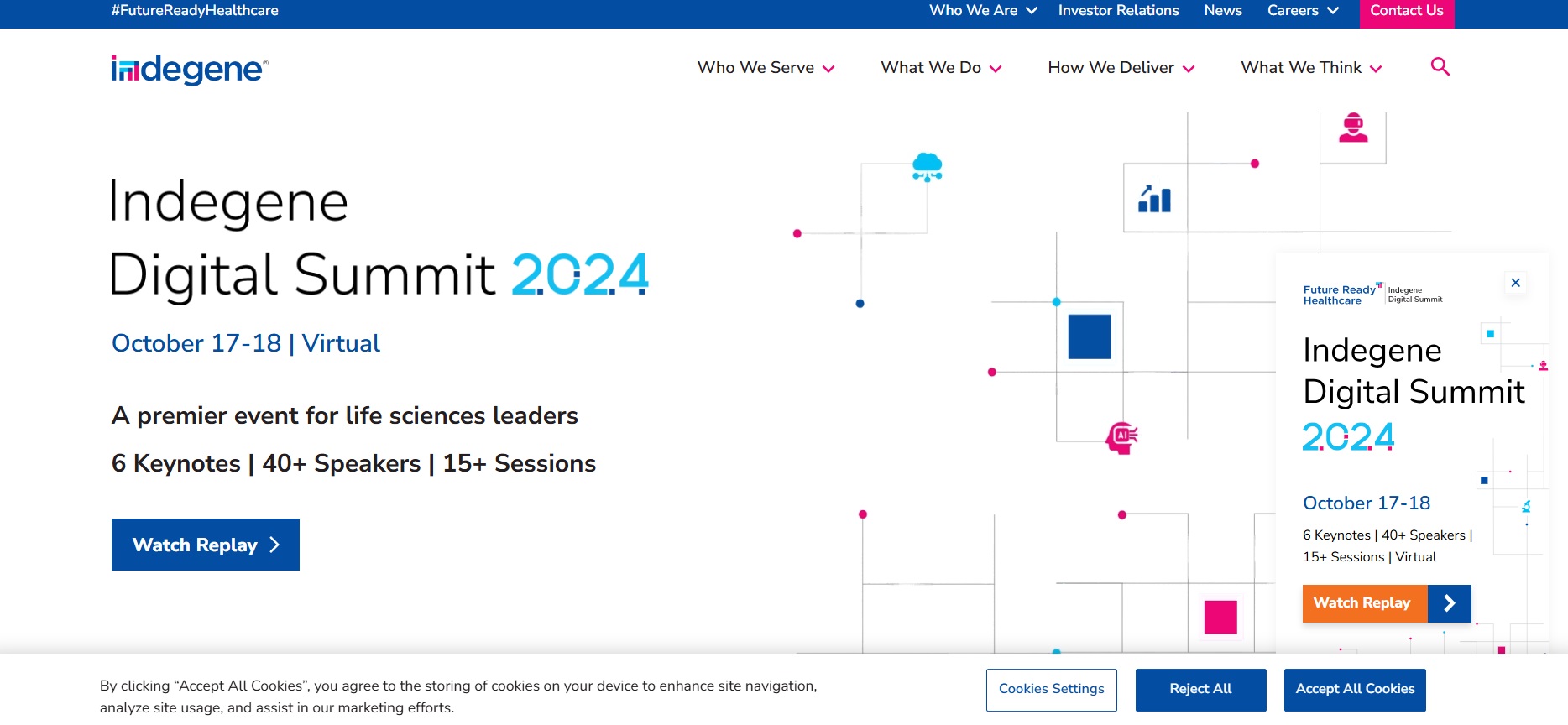Around 85% of users want to do more to protect their privacy according to a report by Norton. As data privacy is becoming an increasing concern, Consent Management Platforms (CMPs) are essential business tools not just for compliance but also for ensuring transparency and more control for its users.
We navigate through the concept of consent management platforms and how you can choose the right one for your business. Learn how to use a CMP to enhance customer trust and guarantee compliance with applicable privacy regulations.
Ensure GDPR and other regulation compliance on your Shopify site in a few clicks
Try TinyCookie freeWhat is a Consent Management Platform?
A Consent Management Platform (CMP) is a comprehensive tool that helps websites personalize user experience while respecting their privacy preferences. To put it simply, a CMP handles user consent management, automates consent collection, and processes users’ personal data in compliance with data protection regulations.
For example, the EU’s GDPR prohibits processing personal data without active consent, and a CMP ensures that it doesn’t happen until the user clicks the “Accept” button. This doesn’t just ensure compliance with applicable laws but also improves transparency and fosters customer trust.
How does a consent management platform work?
A consent management platform provides users with clear data consent choices upon entry to the website using a pop-up or banner. Based on the user’s consent preferences, the CMP automatically signals to the website whether it can proceed with data collection or not.
Here’s a simple step-by-step explanation on how it happens:
- A user enters the website and the consent management platform displays a custom consent banner that provides the user with information about what types of data are collected upon consent and the purpose for collection.
- The user chooses their preferences, whether it’s accepting consent, rejecting it, or managing preferences to pick specific data types to consent to only.
- The CMP records the consent choice and stores it in one place.
- The CMP communicates the consent choice to the website so it would know whether data collection technologies, such as first or third-party cookies or tracking scripts, can be activated.
- The website activates or blocks data collection technologies for the specific user’s device based on their preference.
CMPs remember user consent preferences, so a privacy or cookie banner doesn’t appear upon other visits unless the user deletes their browser data, including cookies.
How to choose a consent management platform?
There are various consent management platforms available on the market, but not all of them are the same. Let’s take a look at what you should look for when choosing a CMP for your business:
Geolocation-based compliance with privacy laws
The right consent management platform for your website will be the one that offers features to ensure compliance with the privacy regulations your store has to adhere to. Some CMPs, like TinyCookie on Shopify, are diverse and can be used to guarantee multiple privacy regulation compliance.
A few of the main privacy regulations around the world include GDPR (EU and UK), CCPA (California), LGPD (Brazil), APPI (Japan), and PIPEDA (Canada). The privacy laws you have to comply with depend on what country you operate in and where your traffic is coming from.
However, many privacy regulations have similar general requirements for consent banners. So, here are some of the features that a consent banner should include for compliance:
- Provide an “Accept” button and refrain from activating data collection technologies before active consent is given (except for CCPA).
- Give users an option to opt out of data collection as easy as it is to accept it. They can also use universal opt-out signals for this purpose.
- Allow including a “Preferences” option – users must be given control to choose what types of data processing they agree to.
- Automatically track and store consents to ensure centralized compliance management and have legal proof of consent.
- Allow adding a privacy policy link to the banner so users can have easy access to the legal document.
- Ensure constant consent option accessibility so users can change their preferences or withdraw consent at any time.
- Easy setup
Implementing a CMP on your website shouldn’t take you more than a few steps, such as pressing the Install button and embedding the app into your website builder or content management system.
For example, a CMP like TinyCookie on Shopify guides you to embed the app in one click upon installing the app, so there’s no way to get lost in the process.
To put it simply, a consent management platform should be easy to use even for website owners who are complete beginners at website building.
Banner customizability
Look for a CMP that gives you plenty of customization options so you can create a banner that matches your brand style. Some of the possible customization options it can provide you with include:
- Content settings. You should have complete freedom over the text of buttons and all other parts of your banner so that you can create content relative to your company and audience.
- Content and behavior. A good CMP will let you choose what buttons or links should be included or excluded. It should also let you set how the banner should behave. For instance, you should be able to choose the close button behavior or whether to add links to your privacy policy or Terms of Service.
- Layout and placement. You should be able to choose where you want to place the banner on your website, whether at the corner of your website or in the middle.
- Design. A white and black consent banner may not fit every site, which is why it’s crucial that the banner’s colors, font size, borders, spacing, and more.
For example, here’s how Detoorp, a sustainable marketplace, customized their TinyCookie cookie banner:
The company didn’t just write clear and simple content, they also matched the font and colors to their brand style.
Supports IAB TCF v2.2 compliance
Choose a CMP that supports the Interactive Advertising Bureau’s Transparency and Consent Framework (IAB TCF v2.2). As defined by the IAB, it’s an accountability tool that helps ensure compliance with the EU’s GDPR and the ePrivacy Directive by applying their requirements to the specific online industry context.
Here’s an example of a TCF v2.2 compliant privacy notice on the Financial Times website:
It’s crucial for web publishers to comply with this standard because as of 16 January 2024, Google requires it if you want to continue serving personalized ads. It’s also just one of the requirements for CMPs to become Google-certified.
Google-certified CMP
If personalized advertising is a part of your marketing strategy, you must choose a Google-certified CMP. This requirement is obligatory from 16 January 2024 and applies to users in the EEA, UK, and Switzerland.
Google’s decision came to light after the changes to the IAB TCF v2.2. The improvements of the IAB TCF v2.2 included increased user control over their consent choices and enhanced transparency.
So, once you find the right CMP for you, you can check if it makes Google’s official certified CMP list to ensure you can leverage ad personalization.
Google Consent Mode V2 support
Google Consent Mode V2 is a tool that helps websites adjust Google tags based on whether the user grants consent. For example, if the user rejects consent, Google tags use cookieless data pings to model their behavior, ensuring more privacy for the user.
It was created to align with the Digital Markets Act so that advertisers would be able to gather conversion data from the European Economic Area (EEA) while in compliance. And as of March 2024, switching to this tool is mandatory for all websites that use Google’s analytics and advertising products.
Google Consent Mode V2 isn’t a standalone tool – it can only be installed if you have a consent management platform that supports it. All you have to do is add a Google Tag to your website using Google Tag Manager or Google Analytics and enable the integration in the code through your CMP.
You can read our step-by-step guide on how to add Google Consent Mode V2 to Shopify with TinyCookie.
Cross-device support
Some CMPs are advanced and can offer cross-device support, meaning the same user doesn’t have to accept or reject cookies on every device they use to access the site. It helps enhance the user experience by providing a seamless consent process.
What are the benefits of using a consent management platform?
Consent management platforms offer multiple advantages related to maintaining compliance and building trust with your customers. So, here are the main benefits in detail:
Privacy regulation compliance
CMPs simplify the process of compliance with the privacy legislation applicable to your business, such as GDPR, CCPA, PIPEDA, and more. All you need to do is add the banner offered by your CMP to your website and it takes care of the rest.
CMPs don’t just provide consent approval or rejection options. They also give users a higher level of privacy control with preference options, a key principle emphasized by privacy regulations. And data collection occurs only after consent is granted.
Most legislations require or recommend collecting consent preferences in one place. A consent management platform automates consent tracking so you always have proof of compliance.
Prevents fines and penalties
By adopting a CMP, you’re much closer to ensuring compliance which also helps ensure you don't face repercussions. With some privacy regulations, you can even get fined for unintentional violations, such as not being aware of or not understanding its requirements.
Some examples of penalties include GDPR fines which can go up to €20 million (roughly $22 million), or 4% of the firm’s global annual revenue based on which is bigger. Meanwhile, intentional violations under the CCPA can go up to $7,500 per single violation.
Builds user trust
A CMP lets you provide information about the data collection and processing practices in a clear and transparent manner. It helps show that your company values its users and their privacy.
According to the 2022 survey done by Cisco, 76% of users don’t want to buy from companies they don’t trust their data with. The same study found that 81% of users agreed that how a company treats personal data demonstrates how it respects its customers.
So, ensuring transparency using a CMP lets you gain valuable user trust and prevents your site from experiencing higher bounce rates or lost sales.
Real-world consent management platform application
Many companies use consent management platforms, whether to simply ensure compliance on a single website or to streamline the consent-gathering process across applications. Here are a few real-world examples of how companies benefit from CMPs:
Barista och Espresso
The Swedish coffee machine supplier Barista och Espresso was looking for an easy-to-implement CMP for their Shopify website. Since their audience consisted of users from many EU and other countries, they needed a solution that would ensure a seamless user experience for all.
The company leveraged TinyCookie’s translation feature to solve this challenge and set the cookie banner to automatically display the language based on the user’s location.
Additionally, the company has added the CMP’s cookie icon at the lower-left corner of their site so that users can change their preferences at any time. And they included a detailed preference window that helps build trust with privacy-conscious users.
Indegene
According to Indegene’s case study, the pharmaceutical company used OneTrust’s CMP to centralize consent data from their applications while maintaining GDPR compliance.
The company has over 16 applications and each of them gathered consent from the same user using different mechanisms. This also resulted in consent choices being stored in multiple platforms.
Indegene adopted OneTrust for all of its applications and helped create an approach to manage consent preferences on a global scale while ensuring compliance with privacy legislation.
The implementation of the CMP resulted in over 1 million records imported from healthcare professional and consumer databases.
Future of Consent Management Platforms
The need for more privacy and personal data control may lead to a user-centric future that goes beyond privacy regulation compliance. There are already technological innovations emerging that are speculated to change the future of consent management platforms.
For example, blockchain and its decentralized nature could improve transparency and give users a glance into how their data is shared while ensuring complete consent choice security from unauthorized alterations.
Another example could be zero-knowledge proofs – a technology that enables users to choose a specific consent preference without exposing unnecessary personal information.
However, the development of new technology doesn’t signal the end of consent management platforms. Instead, CMPs will likely integrate with innovations, enabling businesses to apply more privacy-oriented consent management methods and improve customer trust.
Conclusion
Consent management platforms are important for more than just compliance – it helps businesses foster transparency and trust with their users as well as respect and secure their privacy in the digital landscape.
Adopting a CMP is necessary for any business that handles personal user data to manage their consent choices responsibly. It helps automate many privacy regulation requirements, such as consent tracking, providing preference options, or enabling easy rejection.
Frequently asked questions
Acquiring user consent gives merchants plenty of opportunities to create a better and more personalized user experience. It also ensures website owners can display personalized ads for their users and leverage account-based marketing when consent is granted.
If your website collects the personal data of users, you need a consent management platform no matter what size your business is. It helps ensure legal compliance and improve customer trust by respecting their privacy choices.
Yes, a consent management platform can integrate with third-party marketing tools, such as content management systems or analytics and advertising services.

